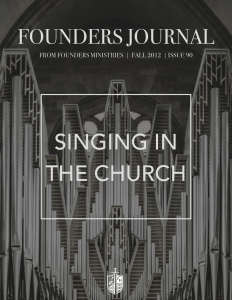When it comes to singing on Sundays, churches have more options than ever before. From hymnals to Hillsong to homegrown creations, pastors and worship leaders have thousands of songs to choose from. A nice problem to have.
But still a problem. No music leader or pastor can keep up. No church can sing all the great hymns and all the latest greatest songs on the radio. No musician can excel in all the available styles. No leader can please all the people all the time.
The proliferation of choices often leads to conflict. Should we do hymns (Wesley, Watts, or Fanny Crosby?) or contemporary (70’s folk music, early seeker service contemporary, or edgy punk rock?). Should our music have a Latin flavor or an African American feel? Should we use chants, chorale music, metrical psalms, jazz, country western, or bluegrass?
There are other questions too. What sort of instruments should we use? How much should cultural context come into play? Is there only one right kind of song to sing? If not, are there any wrong ways?
I can’t possibly answer all those questions. But there are some general principles we can use to make wise decisions with our church music. Let me suggest ten principles for congregational singing.
1. Love is indispensable to church singing that pleases God.
There are more important things than the kinds of songs we sing. Music should not be the glue that holds us together—the cross, the glory of Jesus Christ, the majesty of God, and love should. But even churches centered on the gospel disagree about music. So love is indispensable when we sing and when we are trying to discern what is best to sing.
John Calvin:
But because he [the Lord] did not will in outward discipline and ceremonies to prescribe in detail what we ought to do (because he foresaw that this depended upon the state of the times, and he did not deem one form suitable for all ages), here we must take refuge in those general rules which he has given, that whatever the necessity of the church will require for order and decorum should be tested against these. Lastly, because he has taught nothing specifically, and because these things are not necessary to salvation, and for the upbuilding of the church ought to be variously accommodated to the customs of each nation and age, it will be fitting (as the advantage of the church will require) to change and abrogate traditional practices and to establish new ones. Indeed, I admit that we ought not to charge into innovation rashly, suddenly, for insufficient cause. But love will best judge what may hurt or edify; and if we let love be our guide, all will be safe.1
Before we are quick to judge the lame songs some other Christians enjoy, remember C.S. Lewis’ revelation. Listen to one of the century’s most famous converts to Christianity talk about his early impression of church music:
I disliked very much their hymns, which I considered to be fifth-rate poems set to sixth-rate music. But as I went on I saw the great merit of it. I came up against different people of quite different outlooks and different education, and then gradually my conceit just began peeling off. I realized that the hymns (which were just sixth-rate music) were, nevertheless, being sung with devotion and benefit by an old saint in elastic-side boots in the opposite pew, and then you realize that you aren’t fit to clean those boots. It gets you out of your solitary conceit.2
I imagine the Apostle Paul, if he were writing to the church today, might have something to say about our worship style. “If I sing in style of the hippest music, but have not love, I am only a banging drum or a strumming guitar. If I have a gift for reading music and enjoy the richest hymns, but have not love, I am nothing. If I am discerning of excellent music and fine poetry, but have not love, I gain nothing.” The first principle for singing as a congregation and choosing music for the congregation is love.
2. Our singing is for God’s glory and the edification of the body of Christ.
God is the one we want to impress, the one we most want to honor. Our first aim must not be to win over the culture or appeal to the unregenerate. Worship is for the Worthy One.
Following closely on this priority is the goal of edification. The singing on Sunday morning should benefit God’s people. This is a fair application of Paul’s concerns in 1 Corinthians 14. It’s also part and parcel of teaching and admonishing each other with psalms, hymns, and spiritual songs (Colossians 3:16). We should never approach the music as an entertaining lead-in to the sermon. Before you employ secular songs as your background music prior to the start of the service, consider whether a vaguely spiritual song from U2 will really build up the body of Christ.
Congregational song is part of the teaching ministry of the church. Church musicians and pastors should ask themselves: if our people learned their theology from our songs what would they know in twenty years about God, the cross, the resurrection, the offices of Christ, the Holy Spirit, the Trinity, creation, justification, election, regeneration, the church, the sacraments, and all the other fundamental doctrines of the faith?
3. We ought to sing to the Lord new songs.
Isn’t that a command? A command we haven’t exhausted yet? There are still new songs to be sung to the Lord. What if the Church had stopped singing new songs in the 15th century? We wouldn’t have “A Mighty Fortress is Our God.” What if Christians stopped in the 16th century? No Charles Wesley. No Isaac Watts. What if the Church stopped a generation ago? No one would be singing “In Christ Alone” this Sunday. What a pity.
Sometimes I want to ask to very conservative Christians: “Do you really think the last good song of praise to Jesus has been written?”
4. Church singing should swim in its own history of church singing.
The metaphor is intentional. We should swim in this big ocean of church music, an ocean that is continually receiving new streams. I am not advocating a certain percentage of old v. new—every church will look and feel a little different, but I am suggesting that we should understand ourselves to be a part of this deep ocean of Christian song.
It’s amazing to me that any church would consciously (or unconsciously for that matter) step completely out of the ocean of the historic hymnody and step into a wading pool of nothing but contemporary song. I’m not saying newer songs are inferior to older ones (see previous point). What I am saying is that it is an expression of extreme hubris and folly to think we have nothing to gain from older songs and nothing to lose when we throw out the songs Christians have been singing for hundreds of years.
Think of what you get with a hymnal (whether it’s an actual hymnal or the contents of the hymnal on your screen):
- A link to history. Our people, not to mention the world, needs to know that Christianity is not a novel invention. We sing in concert with two millennia of believers.
- Diversity. I guarantee that those churches using hymns are being exposed to a wider variety of Christian song than those who are exclusively contemporary. The hymnal has twenty centuries of styles: chants, folk tunes, ethnic tunes, carols, psalms, Welsh ballads, English melodies, stout German hymns, gospel tunes (black and white), and dozens of other musical variations.
- Excellence. Yes, there are some real clunkers in most hymnals. But by and large, the bad songs have been weeded out. If we are stilling singing a song five hundred years later it probably has strong lyrics, good poetry, and a singable tune.
- The whole counsel of God. Hymns give you a wide range of themes and biblical categories. Contemporary music is getting better in this regard, but the hymnal is still the best place to find a song on the ascension or the exaltation of Christ or a song of illumination or a lamentation or a communion hymn. Kudos to the Getty/Townend team and Sovereign Grace for trying to fill these kinds of gaps.
5. Sing the Psalms.
I am not convinced by the arguments for exclusive psalmody. But in 95% of our churches the problem is not that we are keeping out good non-Psalms. It’s strange, even though we are commanded to sing Psalms and even though Psalms have been at the center of the Church’s singing for centuries, still we easily ignore the 800 pound gorilla in the middle of our Bibles (to borrow a phrase from Terry Johnson). On a cheerier note, I’m thankful we are beginning to see some contemporary musicians turn their attention to the Psalms.
6. We should strive for excellence in the musicality and the poetry of the songs we sing.
I’m not for a moment suggesting elitism. A tune has to be relatively simple for hundreds or thousands of people to sing it at the same time. But we can still insist on undistracting excellence (to use Piper’s phrase). We want the cross to be the stumbling block, not our poor musicianship or faltering powerpoint.
While I believe a wide variety of styles can be used in worship, I am not a musical relativist. Some songs are better than others. Some styles work better than others. And when it comes to lyrics, we should avoid obvious sloppiness like using thee and you in the same song or heaping up trite cliches. I heard a song on the radio a couple weeks ago whose chorus had something about a fragrant rose in the early spring and an eagle soaring to spread its wings. If your church sings this on Sunday, love your worship leader all the same. But if you’re the worship leader picking this song, try for something with a little more artistry, something that doesn’t sound like it came from a random page in your inspirational pocket calendar.
Some songs are simply deep and some are deeply simple, but there is a way to do both well. With so many songs to choose from, there’s no reason churches can’t make an effort to sing songs with some sense of poetry and musical integrity. The Hallelujah chorus is repetitive, but it’s musically interesting. Most songs, choruses, and verses aren’t good enough to be repeated for very long.
7. The main sound to be heard in the worship music is the sound of the congregation singing.
Everyone is responsible to sing. The young girl with her hands in the air and the old man belting out the bass line. What people want to see in your worship is that you mean it. And no matter how chill or how reverent your worship is, if no one is singing, it’s lame.
And if the main sound is to be the congregation singing, this will have implications for how we play and choose our songs.
- Is it singable? Pay attention to range (too high or too low), and beware of syncopation and lots of irregularities in the meter and rhythm. Make sure the melody makes some intuitive sense, especially if you don’t have music to look at or people can’t read music. When your guitar strums between G, C and D there are a lot of notes to choose from.
- Is the instrumentation helping or inhibiting the congregation to sing? This means checking the volume. Is the music too soft to support the human voices? Is it so loud it’s drowning them out? One mistake music teams make is to think that every instrument needs to be used with every song. Some songs should get the whole kitchen sink, but just because you have a drum, piano, guitar, bass, lyre, zither, flute, chicken shaker, banjo, cello, and djembe up there doesn’t mean you have to use them all.
- Is this song familiar. People cannot handle a new song every week, let alone two or three new songs. Stick with your basic sound and core songs and go out from there. On occasion you may have to admit, “That’s a great song, but I don’t think we can do it well.”
8. The congregation should also be stretched from time to time to learn new songs and broaden its musical horizons.
Every church will have a musical center. You should not reinvent the center every week. But you should not be enslaved to it either. We need to be stretched once a while, not only with a new song but a new kind of song–something from the African-America church, or something from Africa or Latin America (with an English translation so it is intelligible), or something from the classical choral tradition. It’s good to be reminded that belong to an ancient and global church.
9. The texts of our songs should be matched with fitting musicality and instrumentation.
Music should support the theme of the song. Different texts have different moods. The words for “A Mighty Fortress Is Our God” would not work with the tune for “Children of the Heavenly Father.” The campy song “Do Lord” does not quite capture the mood of the dying thief’s final words. On the other hand, you have to love the Getty song “See What a Morning” where the triumphant, celebratory music perfectly matches the resurrection lyrics.
Musical style is not neutral, but it is elastic. Music conveys something. Some melodies are too syrupy or too raucous or too romantic. I’ve always felt like “This is the Air I Breathe” was too sensual sounding. Plus I’m not sure what the song means. But styles are not rigid categories. There isn’t a sharp line between contemporary and traditional, or classical and popular, or high culture and low culture. We don’t have to make absolute rules about musical style, but we do need to be intelligent.
Let me just say a word about organs. No church should die on this hill. But if your church already has an organ my advice is to keep using it. Organs were originally associated with paganism. So there is nothing inherently spiritual about them. When they were introduced into churches, the average Christian in the Middle Ages knew as much about organs as your average teenager does today. They were introduced into worship because of the fitness of the instrument. As Harold Best argues in his fantastic book Unceasing Worship, there is no instrument we know of in the West better suited to support congregational singing.3 The organ fills in the cracks, provides an underneath sound, and encourages churches to sing louder and freer. If you don’t have an organ they can be expensive to get. We mustn’t lay down any commands. But if an organ is an option for you, don’t ditch it.
10. All of our songs should employ manifestly biblical lyrics.
We must start by asking of all our songs: is this true? Not just true, but accurate to the biblical text. For example, I like the Third Day song “Consuming Fire” but the lyrics, while true, misuse the biblical text. According to the song, our God is a consuming fire because he reaches inside and melts our cold hearts of stone. That’s true, but the text in Hebrews is about God our judge.
Similarly, our songs should be manifestly true. That is, we shouldn’t have to put a spin on the lyrics to get them to be ok. We are not looking for subtlety. We don’t want to sing songs that leave us wondering “what exactly does that mean?”
On the flip side, don’t be too hard on “I” songs. About 100 of the 150 Psalms have the word “I.” “I” is not the problem. The problem is with songs that are too colloquially, or use “I” thoughtlessly (I just want to praise you–well then praise him), or never move from how I am feeling about God to who God is and what he’s done to make me feel this way.
In all our songs we want to be teaching people about God. If we aren’t learning good theology and biblical truth from our songs, then either we don’t care much about our songs or we don’t care much about rich biblical truth, or both.
First Published on the DeYoung, Restless and Reformed Blog
(Gospel Coalition), June 28 and 30, 2011
Used by Permission
1 John Calvin, Institutes of the Christian Religion, 4:10:30.
2 C.S. Lewis, God in the Dock (Grand Rapids, MI: Wm. B. Eerdmans Publishing, 1972), 62.
3 Harold Best, Unceasing Worship (Downers Grove, IL: InterVarsity Press, 2003), 73.
This article was originally published online on the Gospel Coalition website in two parts:
http://thegospelcoalition.org/blogs/kevindeyoung/2011/06/28/ten-principles-for-church-song-part-1/
http://thegospelcoalition.org/blogs/kevindeyoung/2011/06/30/ten-principles-for-church-singing-part-2/






























